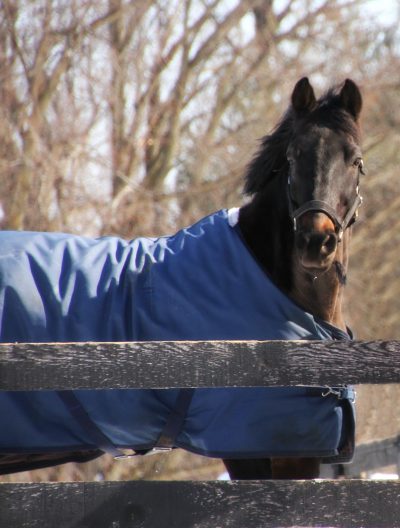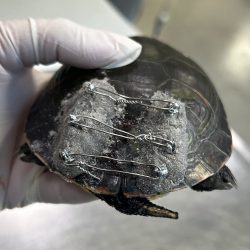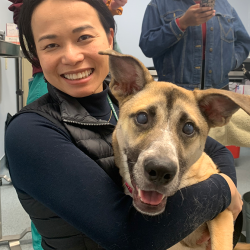
One morning at work, Birgit Villeminey received a phone call from her husband, Jean-Paul, saying that Saumur, their 22-year-old Morgan horse, was not doing well. He was displaying signs of colic, and seemed in severe distress. Saumur had laid down and did not want to move, his eyes rolled back and his legs stiffened. Birgit called her ambulatory veterinarian, who came out to their farm right away to provide sedatives, pain killers, stomach fluids, and a rectal exam. The veterinarian noted that Saumur had little intestinal movement and no gut sounds, and recommended that Birgit and Jean-Paul should take Saumur to the MSU Veterinary Medical Center right away.
It was not easy for Birgit and Jean-Paul to get Saumur into the trailer. Upon arrival at MSU, they discovered Saumur laying on the trailer floor. Drs. Frank Nickels and Hal Schott of the Equine Service started Saumur’s exams and initial treatment, including an ultrasound and a tube into his stomach to help release gas. For the exam, Saumur was heavily sedated because he was displaying violent signs of colic, such as kicking at his belly and repeatedly trying to lie down and roll. The clinicians explained to Birgit and Jean-Paul that emergency abdominal exploratory surgery was the best option for Saumur.
“Of course, there was never a question what to do,” said Birgit.
Saumur was prepped for surgery with Drs. Marc Kinsley and Jarrod Troy. Birgit and Jean-Paul elected to stay, observe, and be present for any immediate decision making. It was difficult for them to see Saumur go through surgery, but Birgit said they were able to breathe a sigh of relief when the surgeon gave them a thumbs up.
“It turned out that Saumur had a fatty tumor called lipoma wrapped around his colon. Luckily, it was caught early, so there was no surgery to the colon required,” Birgit said. “Once the fistful of tissue was removed, all the intestines were cleaned with saline, put back in place, and Saumur’s abdomen was sutured up.”
Birgit said it is thanks to the MSU team’s quick recommendation for surgery that Saumur survived his tumor.
“We caught it early and made the right decision to heed the advice to take him right away to MSU, and then agreed to have the surgery done as quickly as possible, thus preventing major damage to the colon,” Birgit said. “Saumur made it through surgery okay, no problems coming out of anesthesia, and the staff at the MSU Large Animal Clinic is incredible.”
After making it through anesthesia, Dr. Lisanne Gallant, lead veterinarian on Saumur’s recovery, informed Birgit and Jean-Paul that the next 72 hours were vital for Saumur’s recovery. Because Saumur is Insulin resistant, he would need to wear ice boots to prevent laminitis. Saumur’s first night was rough and it took some time and extra treatment for his bowels to start moving. But on the third day, Saumur started showing these signs of recovery. The MSU team started slowly feeding him hay.
After six days of recovery at the MSU Veterinary Medical Center, Saumur was ready to go home with plenty of aftercare instructions–but that’s not all.
“During the trip home, I read the instructions more carefully, and when I got to the end of the last page, I broke into tears,” Birgit said. “There was the following note in French: ‘Un gros merci pour nous avoir donné votre confiance avec votre Saumur. Il est un cheval magnificient et nous sommes très excites de le voir s’en aller à la maison!’ Translation: A big thank you for giving us your trust with your Saumur. He is a magnificent horse and we are very excited to see him go home!”
Birgit said that working with the MSU team has been a wonderful experience.
“I can’t stress enough how wonderful the MSU team is!” said Birgit. “Everyone is tremendously professional, dedicated, positive, and cheerful. Thank you! We couldn’t have had a better experience.”



